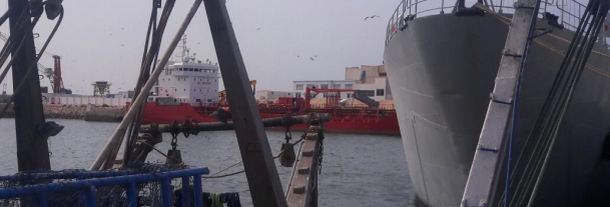Why the Key Bay imports are not in accordance with EU law

This morning, the Key Bay tanker delivered a shipment of fish oil from occupied Western Sahara to France. But why does that potentially violate EU regulations?
Published 23 January 2017
The “EU Hygiene Regulations on Fish Oil intended for Human Consumption and Third Country Establishments" has a section on “Additional information regarding fish oil that is to be imported from third countries into the EU”. There, the Regulation specifies that "when importing fish oil for human consumption from a third country after 30 April 2009, the country must be listed in accordance with Article 11 of Regulation (EC) 854/2004 for import of fishery products."
"Furthermore, the third country establishment from which that product was dispatched, and in which it was obtained or prepared must appear on the lists of establishment from which import of specific products of animal origin are permitted", the Regulation reads.
Was the cargo on the Key Bay in line with that Regulation? Unlikely.
Spanish authorities have already confirmed the information from Western Sahara Resource Watch that the shipment of fish oil of the Key Bay originates from Western Sahara. However, Western Sahara is not on the list of third countries from where fishery products can be imported and there is no list of approved establishments for Western Sahara.
The fish oil aboard the Key Bay most likely came from KB Fish, which is located in Western Sahara, but appears on the list of approved establishments for Morocco.
Moreover, Last December, the Grand Chamber of the European Court of Justice, in the case 104/16 (Council v POLISARIO), decided that the EU Association and Trade Liberalization Agreements with Morocco are not applicable to Western Sahara.
Firstly, the Court ruled, that according to international law and the right to self-determination, Western Sahara has a “separate and distinct status […] in relation to that of any State, including the Kingdom of Morocco” (paragraph 92), and therefore that Western Sahara is not a part of the sovereign territory of Morocco.
Secondly, the Court found that the people of Western Sahara must be regarded as a ‘third party’ to the EU-Morocco relations. Therefore, the Saharawi people must give their consent for EU-Morocco agreements to be applicable to the territory of Western Sahara and its natural resources, “without it being necessary to determine whether [these agreements are likely to harm [the people of Western Sahara] or, on the contrary, to benefit it (paragraph 106)”.
The findings of the European Court of Justice are crystal clear: EU-Morocco trade deal cannot cover the territory of Western Sahara without the prior consent of the Saharawi people.
Following the decision of the Court, Morocco has no authority, according to EU law, to register or approve, in its sovereign capacity, Moroccan establishments located in Western Sahara, without the prior consent of the Saharawi people. But check the list of EU approved fishery products establishments for Morocco and the list of EU approved fishery processing plants for Morocco and run a search for “Laâyoune”, “Dakhla” or “Boujdour”. A sizeable number of the establishments on the EU approved lists for Morocco are in fact located in Western Sahara.
KB Fish - where the fish oil that has this morning entered the Fécamp port most probably came from - is located in El Aaiun (or Laayoune in Morocco's preferred spelling). But it appears on the list of EU approved fishery exporters for Morocco. Remarkably, that list was last updated 9 January 2017; well after the EU's highest Court delivered its Judgment on the matter.
If indeed the fish oil on the Key Bay did not come for an establishment that was approved in accordance with EU law, it has no valid approval number and cannot be imported in the EU.
Morocco has occupied the larger part of the territory of Western Sahara since 1975. Half the people of the territory has since fled their homeland, while Morocco profits from the exploitation of its resources.
News
Key Bay unloaded all cargo in Fécamp, France
Upon arrival to Ghent, Belgium, tomorrow, the controversial vessel Key Bay - transporting fish oil from Western Sahara into the EU - will be empty.
25 January 2017
A lighter Key Bay is on its way to Ghent, Belgium
The vessel carrying fish oil from occupied Western Sahara into the European Union seems to have unloaded some, but not all, of its cargo in Fécamp, France.
24 January 2017
Here is the Key Bay inside the port of Fécamp
Beautiful images of a vessel with an ugly cargo; fish oil taken illegally from an occupied land; the Key Bay in the port of Fécamp.
24 January 2017
Key Bay just outside of port of Fécamp
The vessel carrying fish oil from occupied Western Sahara is about to enter its port of destination, after a delay of at least two days.
22 January 2017


